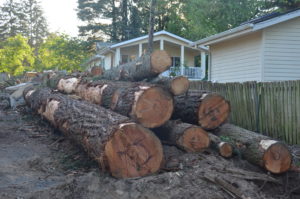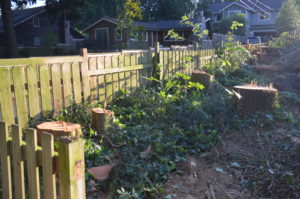
New Seattle poll findings: Voters overwhelmingly favor policies to protect and expand city’s tree canopy
Wednesday September 15th, 2021
For Immediate Release
Contact Andrew Villeneuve
Executive Director
Northwest Progressive Institute
This morning, at a press conference at the Talaris site in north Seattle, the Northwest Progressive Institute and TreePAC announced the release of several new findings from NPI’s July 2021 survey of the Seattle electorate that show overwhelming majorities of voters want their elected representatives to strengthen Seattle’s tree ordinance and protect the Emerald City’s urban forests.
The first question asked:
Do you agree or disagree with the following statement: Seattle’s tree protection ordinance should be strengthened to include increasing tree planting in low income and previously redlined neighborhoods with insufficient tree canopy to reduce heat island impacts and counter climate damage?
82% of respondents said they agreed, while 11% said they disagreed. 7% were not sure.
The second question asked:
Please indicate your support or opposition for each of the following potential ideas for updating Seattle’s tree protection ordinance.
- Increasing protections for significant and exceptional (large) trees
- Adding replacement requirements for significant and exceptional tree removal
- Creating a city tree planting and preservation fund
- Requiring tree care providers (arborists) to meet minimum certification and training and register with the city
- Creating a permitting process for removal of significant trees (trees greater than six inches in diameter at four and a half feet high)
All of the ideas presented received support, ranging from 78% to 57%. Opposition ranged from 13% to 28%.
The third question asked:
Cities like Austin, Texas require developers to maximize the retention of existing trees throughout the planning, development, and construction process, while Seattle allows building lots to be cleared of trees during development. Do you support or oppose requiring Seattle developers to maximize the retention of existing trees throughout the planning, development, and construction process?
81% of respondents said they supported this idea, while 11% were opposed. 7% were not sure.
The poll of 617 likely August 2021 Seattle voters was in the field through Monday, July 12th, through Thursday, July 15th. All respondents participated online. The poll was conducted by Change Research for the Northwest Progressive Institute, and has a modeled margin of error of 4.3% at the 95% confidence interval.
“We’re grateful to have had the opportunity to work with TreePAC to research an important cause that doesn’t get the attention it deserves,” said Northwest Progressive Institute founder and executive director Andrew Villeneuve.
“Voters are ready and eager for their elected representatives to take action to defend and protect the Emerald City’s urban forests. The next Mayor and Seattle City Council must prioritize updating and strengthening Seattle’s tree ordinance.”
“The Mayor and Seattle City Council should take heart in these poll results and move forward quickly to update and strengthen protections for trees and Seattle’s urban forest. The public wants action now after twelve years of delay by city officials,” said Steve Zemke, Chair of TreePAC and a six-year former member of the Seattle Urban Forestry Commission.
“With increasing climate impacts affecting citizens in the city, officials need to act now to stop the unnecessary loss of exiting trees and plant more trees in those areas with low tree canopy. To do otherwise is to ignore both science and the health and welfare of Seattle residents. With better planning, Seattle can continue to add needed housing that is affordable while also maintaining and growing its tree canopy. It is not an either/or situation. We can and must do both.”
“The loss of exceptional and other trees is a tremendous blow to our beloved Seattle, and in particular, our beloved Beacon Hill majority people of color, immigrants and refugees community. We adopted El Centro de la Raza’s Air and Noise Pollution Community Action Plan that calls for us to ‘plant trees.’ But what is the use of planting trees to increase our canopy, if the current trees, especially exceptional ones, are cut down willy-nilly? We need the trees for our health to filtrate the air and noise pollution. This is an environmental, health, and climate injustice issue. We need to stop, think and do what is right for our beloved city of Seattle,” said Maria Batayola of El Centro de la Raza.
“Despite more than a decade of promises, Seattle leaders have failed to improve tree protections,” noted Joshua Morris, urban conservation manager for Seattle Audubon. “Seattle can densify, prevent sprawl, protect more trees, and plant more new ones. We just have to plan for it. Washington, D.C., for example, continues to increase both population density and tree canopy cover through strong tree protections, dedicated funding, and coordinated urban forestry management. We can learn from their example. We can and should do better by our urban forest and for the communities, present and future, that depend on it.”
Previous findings from the poll are available from NPI’s Cascadia Advocate.
Additional contacts for this press release
Comments by Steve Zemke
TreePAC- Chair
Comments by Maria Batayola
Beacon Hill Council – Chair
Comments by Joshua Morris
Seattle Audubon – Urban Conservation Manager-
Comments by Jessica Dixon
Plant Amnesty – Board Member
Comments by Tina Cohen
Northwest Arborvitae – Certified Arborist
About NPI
The Northwest Progressive Institute is a regionally focused nonprofit working from Washington, Oregon, & Idaho to constructively transform our world through insightful research and imaginative advocacy. NPI was founded in 2003 and is based in Redmond, Washington. NPI’s July 2021 survey of the Seattle electorate is its first local poll and builds on the organization’s six year track record of credible, accurate statewide research polling.
Northwest Progressive Institute
8201 164th Avenue NE, Suite 200, Redmond, WA 98052-7615 | Twitter: @nwprogressive





